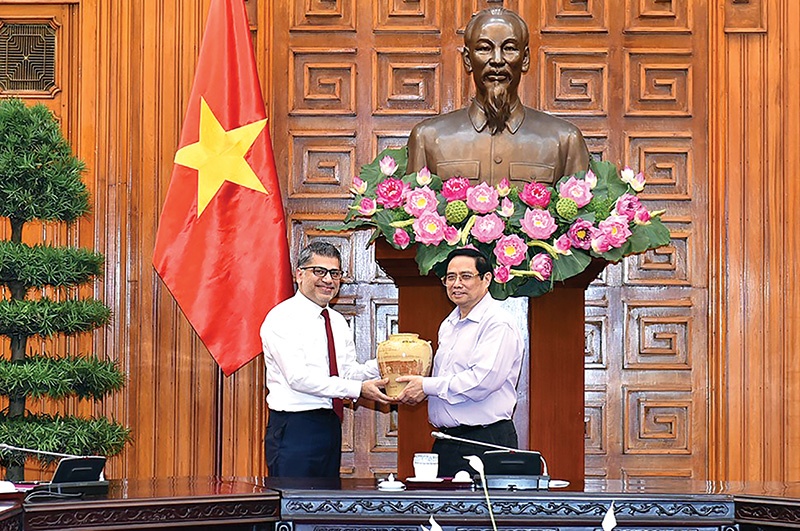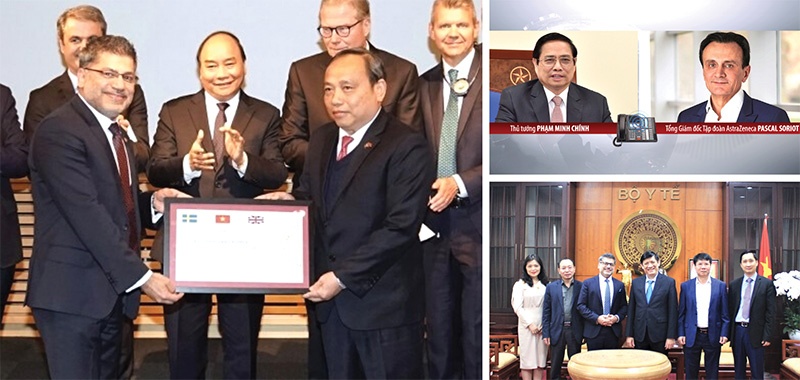AstraZeneca fosters sustainable health development of Vietnam
 |
| Nitin Kapoor, chairman and general director of AstraZeneca Vietnam (left) with Prime Minister Pham Minh Chinh |
The last few years have been very taxing on the healthcare sector. Could you share how AstraZeneca has contributed to Vietnam’s fight against COVID-19?
While it was a real test to the whole world, our innovative and patient-centric spirit has helped us to not only rise to the unique challenges posed by the pandemic but also ensure that we leave no patients or healthcare professionals behind in this trying time.
Globally and in Vietnam, AstraZeneca is committed to ensuring broad and equitable access to our vaccines, to be supplied as quickly as possible and on a non-profit basis during the pandemic period. The principle was echoed by our CEO Pascal Soriot during his bilateral call with Prime Minister Pham Minh Chinh in August.
We are honoured that AstraZeneca’s vaccine was the first to be authorised and supplied in large quantities to support the government’s national vaccination campaign.
Among the vaccines that have arrived in Vietnam, as of late October, approximately 42 million doses, which is 65 per cent of all supplies, are from AstraZeneca. While over 21 million doses of these have been delivered through our advance purchase agreement with VNVC, with the Ministry of Health’s (MoH) support, the rest was supplied via COVAX and bilateral donations between governments.
To support the treatment of non-communicable diseases during COVID-19, AstraZeneca also donated 150,000 boxes of medicines worth $2.7 million to the MoH. These complemented the 400,000 medical masks that we donated last year.
 |
AstraZeneca committed to joining the Race to Zero campaign of the United Nations’ Convention on Climate Change. What made AstraZeneca participate in this programme, and what benefits could your business and the public receive from these actions?
Environmental protection is one of the three main pillars in AstraZeneca’s commitment to sustainability. With over 4 per cent of global greenhouse gas emissions coming from the healthcare sector, we are aiming to lead by example towards decarbonisation.
Through our Ambition Zero Carbon programme launched in last January, we committed to achieving zero carbon emissions across the world by 2025, and ensure our entire value chain is carbon negative by 2030. We’re glad to see this aligns with the Race to Zero campaign and thus immediately signed up to join other like-minded organisations.
Lowering carbon emissions goes hand in hand with increasing efficiency and cost-effectiveness in operations. An example is our Green Energy for Health programme in Vietnam, where we partnered with the UK government and the MoH to donate solar power systems to local healthcare facilities impacted by natural disasters in the Central provinces.
With this new, clean energy source, these hospitals and clinics save costs that can be better invested into upgrading equipment and facilities. They’re also able to access a stable power supply that is critical for emergency services and surgeries for patients.
What do you think are the most important lessons from COVID-19?
What we’ve witnessed is how vulnerable the global health system is in the face of crises such as pandemics or natural disasters. COVID-19 has really highlighted the importance of early detection of diseases, disaster contingency plans, and preparedness, as well as trust in science, transparency, and decisive leadership.
As crises will continue to happen in the future, it’s vital that we increase the health systems’ sustainability and resilience so that it is resistant to whatever comes in its way.
Via the Partnership for Health System Sustainability and Resilience and in cooperation with the World Economic Forum, the London School of Economics, and Vietnam’s Health Strategy and Policy Institute, AstraZeneca Vietnam is contributing to study the Vietnamese health system and offer policy recommendations to strengthen it for the benefits of citizens.
This programme is run in parallel to our other long-term initiatives in the country to increase patients’ access to healthcare and quality of treatment.
What the stars mean:
★ Poor ★ ★ Promising ★★★ Good ★★★★ Very good ★★★★★ Exceptional
Themes: COP26 - Together for Our Planet
Related Contents
Latest News
More News
- Vietnam startup funding enters a period of capital reset (January 30, 2026 | 11:06)
- Vietnam strengthens public debt management with World Bank and IMF (January 30, 2026 | 11:00)
- PM inspects APEC 2027 project progress in An Giang province (January 29, 2026 | 09:00)
- Vietnam among the world’s top 15 trading nations (January 28, 2026 | 17:12)
- Vietnam accelerates preparations for arbitration centre linked to new financial hub (January 28, 2026 | 17:09)
- Vietnam's IPO market on recovery trajectory (January 28, 2026 | 17:04)
- Digital economy takes centre stage in Vietnam’s new growth model (January 28, 2026 | 11:43)
- EU Council president to visit Vietnam amid partnership upgrade (January 28, 2026 | 11:00)
- From Vietnam to the world: Pizza 4P’s global journey (January 28, 2026 | 10:58)
- Vietnam entering a new growth phase in 2026 (January 28, 2026 | 10:02)

 Tag:
Tag:





















 Mobile Version
Mobile Version